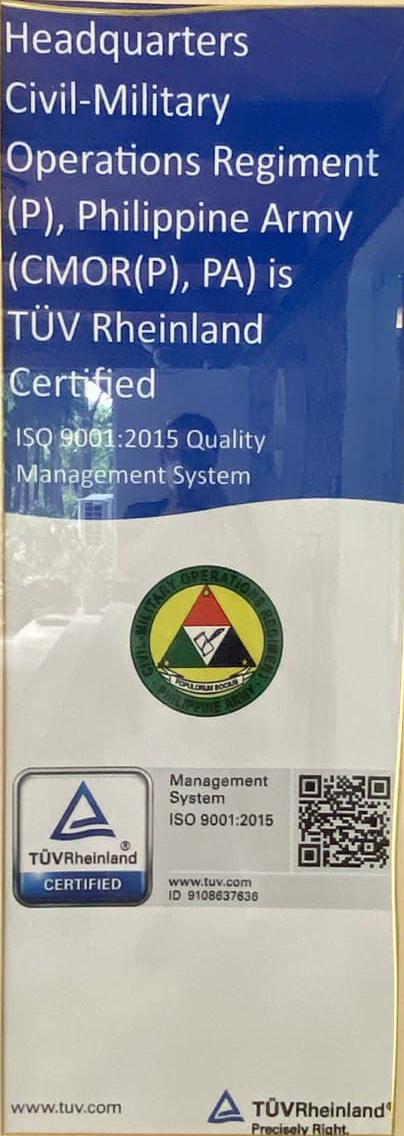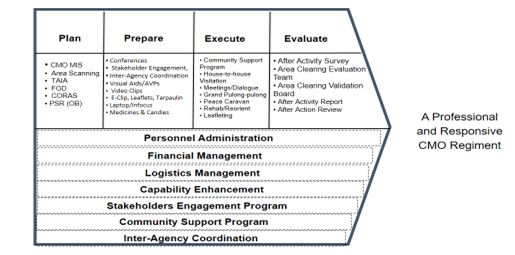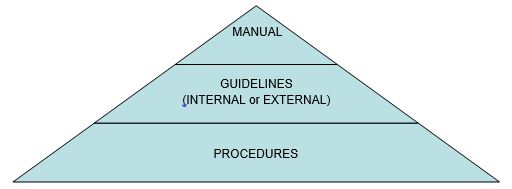
CMO REGIMENT INTEGRATED MANAGEMENT SYSTEM MANUAL
I. OBJECTIVE
This describes the CMO Regiment Integrated Management System in its commitment to maintain a high level of service quality and strong customer focus towards its pursuit for excellence and continuous improvement.
II. SCOPE
The scope of CMOR’s conformance to the requirements of ISO 9001:2015 international standard, complementary to all applicable legal and stakeholder’s requirements, include the following:
• Provision of Civil-Military Operations Services
• Provision of Civil-Military Operations Training Services
III. ROLES, RESPONSIBILITIES AND AUTHORITIES
The following roles, responsibilities and authorities are assigned by the Regiment Commander to ensure the integrity of CMO Regiment Integrated Management System.

Regiment Commander, Deputy Commander, Chief of Staff
3.1.1. Sets the direction
3.1.2. Forms the relevant CMO Regiment IMS team
3.1.3. Approves all directives
3.1.4. Leads the management review
3.2. Steering Committee:
Group Heads
3.2.1. Ensures the integrity of CMOR Integrated Management System
3.2.2. Assures compliance to relevant statutory and regulatory requirements.
3.2.3. Appoints their respective document controllers (i.e. NCO) to:
3.2.3.1. Identify and maintain relevant documented information
3.2.3.2. Control the document distribution to avoid the unintended use of obsolete documents:
Head of GSMO
3.2.4. Ensures the coordinated establishment, implementation, monitoring and continuous improvement of CMOR Integrated Management System
3.2.5. Leads the awareness orientation throughout the organization
3.2.6. Leads the Internal Audit Team and prepares the relevant management reports
3.3. Internal Audit Team:
Chief of Staff
3.3.1. Audits the performance of the Internal Audit Lead
Appointed Internal Auditors
3.3.2. Checks compliance in accordance with the relevant management systems
3.3.3. Ensures that a systematic method is employed prior close-out of reported irregularities (e.g. incidents, non-conformities)
IV. INTEGRATED MANAGEMENT SYSTEM POLICY
4.1. IMS POLICY. The Civil-Military Operations Regiment is committed to serve as a professional, capable and responsive combat support unit of the Philippine Army through:
a. Focused and purposive Civil-Military Operations to satisfy the stakeholders’ requirements;
b. Organized institutional approach towards self-empowerment; and
c. Establishment of feedback mechanism towards continuous improvement.
4.2. CMOR IMS Policy shall be communicated and is made available to interested parties by posting in particular conspicuous areas.
V. CMOR INTEGRATED MANAGEMENT SYSTEM
5.1. The Civil-Military Operations Regiment shall apply a process approach in order to sustain its effective and efficient operations.

Operational Objectives are established in line with:
CMOR Vision:
By 2028, to be a world-class Army that is a source of national pride.
CMOR Mission:
To conduct Civil-Military Operations and related trainings in support of the Philippine Army’s mission.
CMOR Strategic Objectives:
a. Institutionalize engagements and partnership with stakeholders;
b. Adopt a highly responsive finance and logistics Management;
c. Recruit and retain the best and the brightest;
d. Continuously build and develop the character and competence of CMOR Personnel;
e. Motivate our personnel through effective and efficient management;
f. Implement deliberate planning and adequate process driven preparations for activities;
g. Institutionalize efficient delivery of CMO activities, products and Services;
h. Develop comprehensive and decisive assessment of delivered CMO activities, products and services; and
i. To become a Professional and Effective CMO Organization.
5.1.2. PREPARE. Support groups shall provide the necessary and available resources to support the core operations. Where applicable, these groups shall ensure that these resources are monitored and measured by competent professionals.
5.1.3. EXECUTE. The core processes, Civil-Military Operations and Conduct of Training Sessions, shall follow a corresponding operational P-D-C-A cycle:
5.1.3.1. Operational Planning and Control
Below relevant documented information shall be identified, controlled and maintained:
Evidence of conformity shall be maintained and retained through the documentation cabinet.
Service requirements design and development, including changes to the plan, shall be reviewed and approved by the Group Commander.
Where applicable, outsourced processes shall be controlled through established service levels, usually through directives.
5.1.3.2. Implementation
The control of service provision shall be in accordance with the plan. Results of the implementation shall be retained.
5.1.3.3. Monitoring
While monitoring the conduct of the service, incidents that may happen shall be acted upon in reference to the risk register, if identified. Proper communication, systematic analysis, corrective action and verification of the actions taken shall be applied to prevent recurrence.
5.1.3.4. Continuous Improvement
Results (e.g. surveys, performance), including those performed by either internal or external audit parties, will be reviewed.
5.1.4. EVALUATE. All results of evaluation (e.g. customer satisfaction survey) shall form part of the succeeding planning sessions, towards the journey to continuous improvement.
VI. REFERENCES
ISO 9001:2015
HPA directives and applicable regulatory requirements

